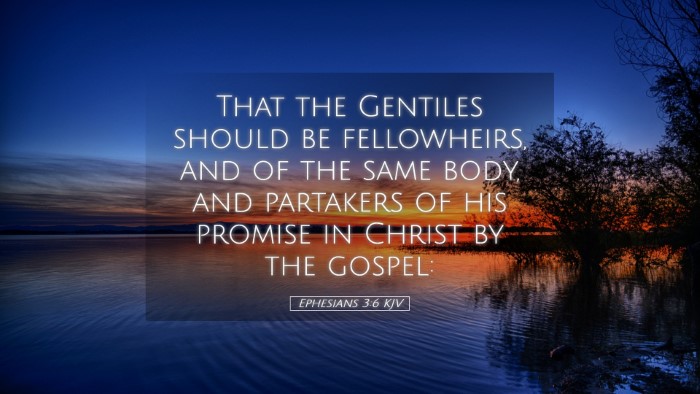Ephesians 3:6 - Commentary and Insights
Ephesians 3:6 states, "That the Gentiles should be fellow heirs, and of the same body, and partakers of his promise in Christ by the gospel." This verse is a pivotal statement in the Epistle to the Ephesians, emphasizing the inclusion of Gentiles in the covenant of grace. The following commentary summarizes insights from various public domain sources.
Contextual Background
This passage occurs within a larger discourse where the Apostle Paul outlines the mystery of the Gospel. In the preceding verses, Paul discusses his role as a prisoner for Christ and the divine revelation he received regarding the inclusion of Gentiles. Understanding this verse requires recognizing the socio-religious context of first-century Ephesus, where both Jewish and Gentile believers were learning to coexist within the body of Christ.
Exegesis and Interpretation
The key components of Ephesians 3:6 can be understood through its three phrases: "fellow heirs," "of the same body," and "partakers of his promise." Each of these phrases sheds light on the nature of Gentile inclusion in the kingdom of God.
- Fellow Heirs: This term indicates equality in inheritance. Matthew Henry notes that in Christ, Gentiles receive the same blessings as Jews, affirming that God’s grace extends beyond ethnic and cultural boundaries. Albert Barnes expounds upon this by stating that the Gentiles share in the same spiritual inheritance promised to Abraham, highlighting that the blessings are not exclusive but universally available.
- Of the Same Body: Paul often uses the metaphor of the church as the body of Christ. Adam Clarke underscores that this unity signifies that all believers, regardless of their previous separations, are now joined together in Christ. This establishes a new identity in the community of faith, where divisions based on race or prior religion are erased.
- Partakers of His Promise: The promise referred to here encompasses the richness of the Gospel and the overall salvation plan. Matthew Henry emphasizes that this promise, made to the fathers (Abraham, Isaac, and Jacob), is now accessible to all who believe in Christ. Barnes adds that this point illustrates the depth of God's mercy, as it includes those previously considered outsiders.
Theological Implications
The implications of Ephesians 3:6 extend into various theological realms, including soteriology, ecclesiology, and missiology.
Soteriology
This verse affirms the universal offer of salvation. In Christ, the barriers that once separated Jew from Gentile are dismantled, echoing Paul’s message in Galatians 3:28, “There is neither Jew nor Gentile… for you are all one in Christ Jesus.” Such insights call for a reevaluation of exclusivity in ministry and highlight the transformative power of the Gospel across diverse populations.
Ecclesiology
Ephesians 3:6 encourages a holistic view of the church as a diverse but unified body. Adam Clarke's observations about the communal aspect challenge believers to embody the inclusivity of Christ in their gatherings. This understanding promotes harmony among varied believers, as described in 1 Corinthians 12, where differences are celebrated to strengthen the body.
Missiology
The missional aspect of this verse propels the church into action, embracing a global vision. Paul’s articulation of Gentile inclusion should inspire contemporary believers to engage in cross-cultural missions, recognizing that every tribe and nation is part of the divine purpose unveiled in the Gospel.
Practical Applications
Pastors and students of Scripture are often led to contemplate how to apply the truths of Ephesians 3:6 in their ministries today. Consider the following applications:
- Fostering Inclusivity: As the church seeks to embody the message of Jesus, it must actively pursue inclusivity, ensuring that all individuals feel welcomed and valued within the body of Christ.
- Cultivating Unity: Believers should strive to work towards unity in Christ. This may involve practical steps in addressing prejudices, building relationships, and learning from one another’s backgrounds.
- Engaging in Mission: The great commission extends to all believers, motivating congregations to reach out beyond their immediate context and share the Gospel with diverse populations.
Conclusion
Ephesians 3:6 provides rich theological and practical insights into the nature of God's grace, calling all believers to embrace the fullness of the Gospel. Through the lens of this verse, pastors, students, and theologians are challenged to reflect on their roles in promoting unity, inclusivity, and missionary engagement. The words of Paul resonate deeply today, reminding us that in Christ, all are heirs of His promise, drawn together in one body, the church.


